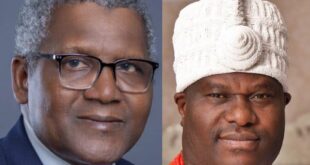 By Lateef Ositelu
By Lateef Ositelu
World Teachers’ Day is celebrated around the world on the 5th of October. It is also known by some as International Teachers’ Day. The event was established in 1994 and it commemorates the signing of the 1966 UNESCO/ILO Recommendation concerning the status of teachers. And to celebrate this day, UNESCO runs a campaign every year to help the world gain a better understanding of teachers and the impact they have on the development of students within society.
Mustafa Kemal Ataturk, former President of Turkey says, a good teacher is like a candle, it consumes itself to light the way for others. There is no contention about the positive contributions of teachers to human capital development globally. Teachers turnout engineers, filmmakers, writers, astronauts, architects, lawyers, doctors, entrepreneurs and among others. It means without teachers, the world would not have great leaders and heroes who make our planet a better place for all.
It is quite pathetic today those teachers are not respected for their sacrificial role of burning like a candle while impacting knowledge on others to attain success. If we consider what they go through on a daily basis in the local communities and hinterlands of most developing countries, particularly in sub-Saharan Africa, one will but be touched to decry the contempt teaching profession is subjected to.
Recent discovery has shown that over 60 percent of teachers do not have job satisfaction and are psychologically discouraged due to low take home pay, deprived welfare packages and disregards for their salient contributions to nation building. The postulation that – ‘Teachers Rewards Are in Heaven,’ a common submission in some Nigerian societies that gives credence to the fact that teachers are regarded as personal non-grata. Teachers at all levels should enjoy the labour of their hands while alive and not in their post mortal state. According to John Dewey, an American Philosopher, education is not preparation for life, education is life itself.
In the past, teachers in Nigeria had made great waves as in the 50s, 60s, 70s, and even early 80s when they were held in high esteem. Even then each ethnic tribe in Nigeria used to psych up teachers with different appellations as they perceive their developmental roles in the society. For example, Yorubas call a teacher ‘Oluko ni’ meaning the builder of intellects, the Ndigbos call a teacher – ‘Oye nkuzi’, meaning a person that educates while the Hausas refer to a teacher as – ‘Malamu’, someone that reveals knowledge. The Oxford Advanced Learners Dictionary, describes a teacher as a person who impacts on someone or instructs someone on how to go about something. It means from time immemorial, teachers had been primo inter Peres across several tribes in developing countries before the collapse of societal cherished values for teachers.
Findings revealed that 75 percent of teachers have been demoralized by this perceived societal neglect and poor government concern for their wellbeing. This has simulated an impaired academic success with collateral consequences on the society, as teachers were indirectly forced to divert their core objective on their survival track in a bid to meet up with their financial shortfalls.
It was also deduced that, nation building in Africa will remain intricate as the teachers, the stabilizer of the society are suffering from psycho-economic challenges. For example, the three societal stages, namely; the home front, school environment and the society are left mainly for teachers to crop. Apart from the school environment the teachers are employed to work, they still serve as nursing mothers and social counselors for students. As a matter of fact, the home front for training a child has collapsed, 75 percent of parents no longer have time to nurture their children due to twenty first Century industrial- rush off syndrome.
A report from UNICEF in 2020 showed that children around the world appreciated their teachers for sacrificing their times and lives to teach them during and after COVID- 19 pandemic, this indicates that 80 percent of parental responsibilities are heaped on the drained and poorly motivated teachers alone, and these challenges sometimes turn their efforts to ‘flash in the pan’. Sociologists opined that the work stress may have negative impact on the teachers behavioural pattern as exemplified in a Yoruba adage which says ‘omo olomo ole pa iya oniya,’ meaning someone else’s child cannot kill someone else’s mother.
Invariably over 60 percent of children are seriously affected by this ‘social playlet’ leaving the society with slimly baked children to manage. The consequences are evident in the high spate of cybercrimes, banditry, armed robbery, kidnapping among other criminalities being perpetrated by ill trained children who are now torn in the flesh of peaceful co-existence in Nigeria. Experts say the growing insecurity will continue unabated until governments at all levels respect the teachers and the teaching profession in accordance with global standards. No wonder the great Greek Philosopher, Plato (428-347 BC) said, no society develops beyond the capacity of its teachers.
Although every October 5th is World Teacher’s Day, set aside to celebrate the teachers’ contributions to global development annually by the United Nations Educational, Scientific and Cultural Organization UNESCO where the world appraises their collective challenges and discusses the way forward. It is commendable that some State governments in Nigeria used to celebrate teachers yearly on this occasion, even though the gestures may be far cry from the expectations but it should be acknowledged.
Like the Ogun State Governor Prince Dapo Abiodun ‘Omo teacher,’ who celebrated teachers in 2019 World Teachers Day and fulfilled some of his electoral promises which included; approved promotion for 10, 000 teachers and non-teaching staff that were stagnated in 2016 and 2017 promotion exercise, restored the payment of running cost for teachers in schools which was cut for eight years, improved working/learning environment for teachers as well as students and reinstated two teachers Messrs. Olusanjo Majekodunmi and Oludare Ilekoya who were forcibly retired among others welfare for teachers in the state.
In South Korea, Teachers are known as nation builders, while Finland regarded teachers as key success behind the country’s development. Nigerian government should also take a cue from these countries and encourage the teachers, motivate them adequately and respect the profession as noble. Because a poorly trained student will definitely ruin the national heritage. Education experts in Finland submitted that teachers are agents of nation building with the capacity to guide and inspire the children to achieve set goals and to be morally upright.
As we celebrate Nigeria independence at 60, government at all levels should drop politicking and crop up policies that will set the country as an academic trailblazer in sub-Saharan Africa and beyond. The Federal Government should use the occasion to celebrate Nigerian teachers by organizing a national symposium on Television and Radio stations where stakeholders across the six geo-political zones will discuss challenges facing the profession and teachers’ wellbeing in the nation building.
*Ositelu of Ogun State Ministry of Information & Strategy, writes from Oke-Mosan, Abeokuta, Ogun State.
 Startrend International Magazine For Your Latest News And Entertainment Gists
Startrend International Magazine For Your Latest News And Entertainment Gists





